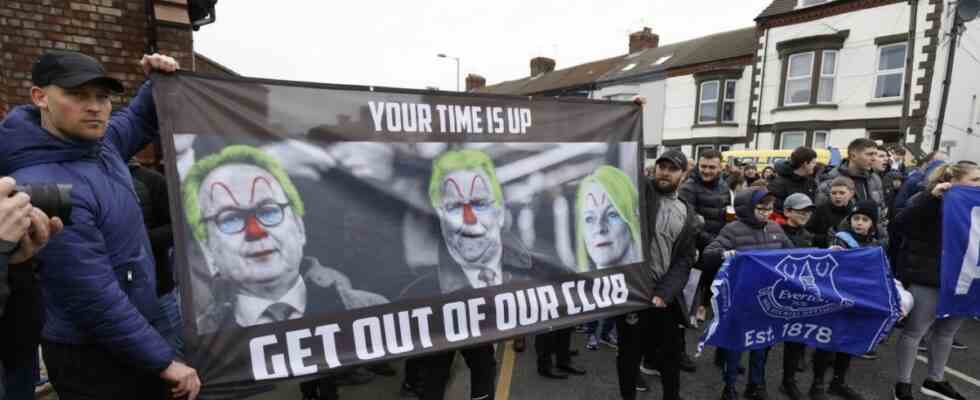Football has always been considered the most beautiful thing in the world. However, in England, the actual motherland of football, the game itself has recently become more and more of a minor matter. The owners of the professional clubs seem to be increasingly putting their self-interests ahead of the needs of their footballing workforce in this billion-dollar business, instead of goals and titles they are more concerned with money, power or visibility. The owners of the top clubs in the Premier League in particular have taken this approach to the extreme – and are now getting the political reward for it.
The UK government announced on Thursday that it would set up an independent regulator for men’s football in England and, in the process, adopt a new licensing system for professional clubs. The introduction of such a supervisory body, which is authorized to issue directives to the league associations and to monitor the business conduct of the clubs and sanction violations, is a political intervention in the hitherto extensive autonomy of football that is quite unprecedented in democratic countries. The Department for Culture, Media and Sport has itself hailed the realignment as “the most radical transformation” in the history of English football, which is now over 165 years old. After a consultation phase, the plans are to be “legally” anchored as soon as possible, the ministry said.
The drastic transformation concept includes, among other things, a stricter owner and director test to ensure that the clubs are “in good hands”. Not only the integrity of the club representatives should be checked, but also “with the greatest care” the financial sustainability of the business plan and the origin of the assets. In addition, any club owners are prohibited from changing the name, crest and jersey colors of the club without consulting the respective fans. Even if the home stadium is sold or relocated, approval from the new regulatory authority must be obtained.
This authority was also given a mandate to intervene in the ongoing dispute between the Premier League and the English Football League, which is responsible for the lower professional leagues. So far, both parties have not been able to agree on the amount of the solidarity payments from the first division clubs from the income from television rights. But most importantly, this body, in consultation with the English Football Association (FA), has the power to ban clubs from entering new competitions that could “damage domestic football”. As an example, the European Super League is promptly cited, in the attempted formation of which in April 2021 six top English clubs (Arsenal, Chelsea, Liverpool, Manchester City, Manchester United, Tottenham) were involved. This franchise league would have unhinged the previous competitive structure.
In response, then Prime Minister Boris Johnson threatened to launch a “legislative bomb”. Six months later, the former Sports Minister Tracey Crouch presented a working paper on this subject: “Fan-led Review of Football Governance” – whose reform proposals are now actually being largely implemented. In the meantime, the project stalled after Johnson’s resignation in the summer of 2022, until the current Prime Minister Rishi Sunak spoke out decisively in favor of the ideas. The project, Sunak says, will “put the focus back on the fans”, protect the clubs’ rich heritage and traditions and preserve football “for future generations”.
The government is also pursuing its own goals: fans are also voters
In doing so, the government is putting a stop to the increasingly absurd excesses of the fully capitalized football industry in England: the imposture of the lower class clubs and the megalomania of the top clubs. The withdrawal of the license from the economically devastated fourth division club Bury FC in August 2019 and further imminent bankruptcies in the wake of the corona pandemic sparked a moral uprising in the country.
However, the undoubtedly sanctioned operation is being marketed to the public as if it were being done solely on behalf of the fans, with it’s not even entirely clear who the “fans” actually mean. The government is pursuing its own goals in this matter, as are most club owners – if only for the reason that most fans in Great Britain are of course also voters.
With the core of the measures, the state secures control over English football, especially the Premier League and its club owners. Due to its global appeal, the league is one of the country’s most important export hits. The clubs attract international investors and attract attention. And at home, in the home market, they create jobs and generate billions in taxes. Therefore, a split of the top clubs would probably have hit the Premier League hardest of all European leagues – especially the owners of all those small and medium-sized clubs that benefit from the evenly distributed television revenues in England. The step was received correspondingly positively by the associations. The Premier League spoke of a “significant moment” and recognizes a “necessary change” in the way clubs are run.
As expected, the Premier League clubs themselves reacted far less enthusiastically to the new monitoring. David Sullivan, co-owner of West Ham United, berated the government and described the regulator as a “total waste of money” with what is likely to be a “huge staff”. The reason: The clubs in the Premier League should bear the majority of the costs according to their annual income. The clubs may only have liked the mention below that the existing visa system in football was being reviewed. Since Brexit, clubs are no longer allowed to sign underage players from Europe.
Depending on the details of the reforms and the consequences of their implementation, the game itself could gain more importance in England from now on – and not just business.

